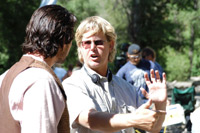Michael Landon Jr. is a chip off the old block in more ways than one.
Like his dad—star of Little House on the Prairie—the younger Landon, a director, likes telling stories from the old days, particularly the 19th century, and particularly about frontier life. Look no further than his four films in the Love Comes Softly series, based on the popular historical novels by Christian author Janette Oke.
The movies have been hugely popular on The Hallmark Channel, where they all originally aired, and have been among the best-selling DVDs in the Christian market.
Unabashed chick flicks, the Love Comes Softly movies are most popular with women—yet another way Landon is like his father, who died of cancer in 1991. Women adored the elder Landon, and they love the younger too—though Junior’s work is all from behind the camera, while his father’s work was mostly in front of it.
Hallmark is committed to all eight films in the series (the fifth, Love’s Unending Legacy, will air in June), but Landon bowed out after No. 4, Love’s Abiding Joy, because of creative differences with the production company.

So Landon broke away and, with an old friend, formed his own production company, Believe Pictures. Their first film, The Last Sin Eater, made with FoxFaith, had a brief theatrical run in February, and releases to DVD today.
We talked to Landon, 42, about the Love series, about The Last Sin Eater and his upcoming film, Saving Sarah, and about the whole notion of what it means to make films for a “Christian audience,” which Landon says can be quite a challenge.
Why did you quit making the Love Comes Softly movies?
Michael Landon Jr.: The company behind those movies—Larry Levinson Productions, who makes all of Hallmark Channel’s films—is very controlling. It was really only the first movie, Love Comes Softly, where I had a certain amount of autonomy. After that, they tightened up the reigns and became more and more controlling—which is kind of strange, because the first one was the highest rated movie in the history of the channel.
So, you’re thinking, “Don’t mess with a good thing.”
Landon: Yeah. But suddenly they started becoming much more hands-on and forcing certain casting decisions on me. You don’t get to pick your DP [director of photography]; you don’t get to pick your editor. It’s not an easy place creatively to work.
Love Comes Softly was the No. 1 selling DVD in Christian bookstores last year, even outselling Narnia. And Love’s Enduring Promise and Love’s Long Journey were No. 3 and 4.
Did that sales success mean anything to you financially?
Landon: No. It was a for-hire job, and [the pay] is very paltry over there … even though it has done quite well for Larry Levinson Productions.
Now you’ve moved on to TheLast Sin Eater and other future projects with Fox. How did that come about?
Landon: When Fox picked up Love Comes Softly [for home video], they weren’t really expecting much out of it. But when sales increased, Fox came to me and said, “We want to be in business with you.” I called someone I had known for many years, Brian Bird, and we formed a company, Believe Pictures, and The Last Sin Eater became our first film for Fox. And we’re finishing up our next one, Saving Sarah, based upon a Beverly Lewis novel. That’s out in August.
Did you and Brian sign a multi-film contract with Fox, or is it one film at a time?
Landon: One at a time. And if they’re pleased, we go to the next one. And though The Last Sin Eater didn’t do very well in the theaters [$388,000], the exit polls spoke differently, with the lowest grade at A-minus. So we hope it’ll do well on DVD.
Why did you and Brian choose The Last Sin Eater as your first project?
Landon: I liked the book. I think Francine Rivers is one of the best Christian fiction authors out there. She weaves a beautiful story with this amazing historical backdrop with this Celtic ritual at the center of the story. And then there’s this little girl trying to be freed from her guilt, of going on a journey to find the sin eater—only to find the ultimate truth and the only freedom from sins.

After feeling stifled creatively on the Love Comes Softly films, was it liberating to make Last Sin Eater?
Landon: Well, the dollars determine that—what kind of equipment you can use, what kind of a shooting schedule. We only had $2.3 million with a 22-day shooting schedule; that’s pretty tight. On top of that, you have a minor in just about every scene, and there are laws against working minors more than eight hours a day. So it definitely poised some challenges.
With limited resources, a lot of compromises are made. But I feel very blessed—and it was freeing that I didn’t have somebody over me saying what we could and couldn’t do.
Any theories about why it didn’t do well at the box office?
Landon: Yeah, and actually, Fox took a large part of the blame. The only way for a little movie like this to succeed is to get the word out. Facing the Giants spent six to eight months prior to its release doing screenings for pastors, trying to get the buzz going. With Sin Eater, there was less than two weeks to start getting the word out. Theater owners have no interest in keeping a movie in the theaters in hopes that the word spreads. If people don’t show up that weekend, it’s gone. I’m not saying it would’ve been a massive blockbuster, but because of the response from people who did see the film, I think it would have had a shot—had there been a chance for word of mouth to spread.
I guess Fox hopes Sin Eater‘s DVD sales will be much better than the box office.
Landon: If it comes close to even what Love Comes Softly did in video sales, I think they’ll be very happy.
Is that a reasonable expectation?
Landon: I believe it’s got a shot. Like Love Comes Softly, first and foremost this movie is targeted toward females. If females connect with this film, with the idea of separation through guilt and the need for redemption and the bringing back of a mother/daughter relationship, then I think it has a shot at doing quite well.
All of your films target females. Do you dig making chick flicks?
Landon: Oh, yeah! That’s my world. Actually, I do want to do something with explosions and body parts flying everywhere at some point, just to try to get a little bit of the testosterone going again.
Love Comes Softly meets the Terminator?
Landon: (laughing) Exactly! But, seriously, I grew up with this genre [with Little House on the Prairie] of courting the female audience in hopes that the male audience will then join in. That’s kind of what happens with Love Comes Softly. You don’t have a bunch of guys getting together and saying, “Hey man, let’s go rent Love Comes Softly.” I know my audience is primarily female, and that’s the case for The Last Sin Eater, and it will be the case for Saving Sarah.
Is that propensity inherited from your dad in some ways? Most of his work appealed primarily to women.
Landon: Pretty much all of it was. Yes, he definitely rubbed off on me. My favorite of my father’s work is Little House on the Prairie. So he definitely had an impact on me.
What do you make of Hollywood’s relatively newfound push to the faith-based market?
Landon: Obviously there was a market that had been underserved, and now it’s just a matter of exploiting that market. Some people are sincere about it, and some people just see the dollar at the end of the tunnel. I think it’ll be like any other genre—you’ll have good movies and bad movies. At the end of the day, it’s the one who decides whether or not they’re going to plunk down seven dollars to see it in a theater, or nineteen dollars to pick up the DVD. It’s going to be up to them.
But isn’t it also up to the studios? Won’t they have to say, “We’re being cheap in giving Michael Landon just 3 million dollars.” When are they going to give you $15, $20 and $30 million to give you a better chance to make a great movie?
Landon: That’s a great question, and it’s one that is definitely being asked. It’s very difficult on these low budgets to make a great movie. That is the challenge.
But which comes first, a successful low-budget film, or a $20 million budget? Or does the studio say, “Look at the numbers on Sin Eater; you’re nuts if you think we’re going to give you $20 million”? Do they need a monster breakthrough, like Facing the Giants earning 10,000 percent of its cost? Which has to come first?
Landon: There’s opportunity to look at it from both sides. I wouldn’t necessarily say The Last Sin Eater is the right movie to spend $20 million on. I was given what I was given, and I did the best I could with those dollars.
Theatrical releases are so driven by the teen marketplace. That’s who you have to appeal to in order to be highly successful. My brother [screenwriter Christopher B. Landon] has a movie out [Disturbia] that was Number one for three weeks in a row. That movie targets the teen audience. For studios to spend those dollars now, you have to have a story that’ll bring the teens into the theater.

Your business partner, Brian Bird, has said filmmakers of faith need to be careful not to form a “Christian ghetto”—don’t just preach to the choir, but make movies with as much universal appeal as possible. But when you make a film based on a book by Janette Oke or Francine Rivers, that’s primarily for a Christian audience.
Landon: Absolutely.
So, you’re not necessarily thinking in terms of “universal appeal”?
Landon: Well, it’s universal in that you’re dealing with universal themes—redemption, forgiveness, unconditional love—and then the question is, what is the worldview? Every movie has a worldview. And for me, as a Christian, Jesus didn’t give us any fudge room on that particular aspect of life.
I get what Brian means by “the ghetto,” but at the same time, because a story is “exclusive” in its truth, I don’t think that ghetto-izes it. When you start to water things down, it has no value anyway. Anything that has a powerful message is coming from some place, and so you put it out there and hopefully in telling that story, it resonates with someone—whether they are a believer or not.
I hear a lot of this dialogue with Christians being concerned about the ghetto of telling stories. I get their concerns about bad storytelling. But I don’t think you’re heading into the ghetto just because you’re sharing a worldview with a specific truth factor to it.
When you make a movie for FoxFaith, I would think you’d have to have the Christian audience primarily in mind—especially when you’re adapting a book that’s already been embraced by Christians.
Landon: Yes and no. First, because it’s an adaptation, the material is driving you in a specific direction. And second, it’s a story that’s already resonating with me. So it’s not like I say, “Okay, I’ve really got to nail the Christian audience with this next line.” That never comes into play. It’s still the story that drives the film. In The Last Sin Eater, it’s the story of this little girl’s need to be forgiven. I’m never “pandering” to a Christian audience. My goodness, no.
Christians can be a tough audience. They want “truth,” but not necessarily the depiction of hard reality.
Landon: Yes. And I’ll say this about the Christian audience: Sometimes there is something like hypocrisy that is taking place. The same people who will patronize a secular PG-13 or R-rated movie will have a different standard if there is violence or sexuality or language content in a Christian film. I don’t get that.
There’s a huge audience that claims to be Christian, and a certain amount of hypocrisy that germinates our culture. They go and see some R-rated film that has much more explicit stuff than a Christian-based film where you can’t. How in the world is anybody going to tell a really good urban story if these kids from the streets are saying, “Oh, gosh darn!”? You’re definitely not going to speak to the ones you’re hoping to speak to—kids living in the urban city. They’re going to turn it off in a nanosecond.
Now you have to draw lines, because you never want to use the Devil’s tools to tell your story. For example, if you use something sexual in nature, you never want it to be used for the wrong reasons. So there are boundaries that a Christian filmmaker has to be very careful of. But sometimes I think, man, how cool it would be not to be a Christian and have no boundaries to telling a story. You could just put anything out there and not worry about the consequences. But no, that will never work with me. Never.
For more on Michael Landon Jr., read our 2005 interview here.
Copyright © 2007 Christianity Today. Click for reprint information.











